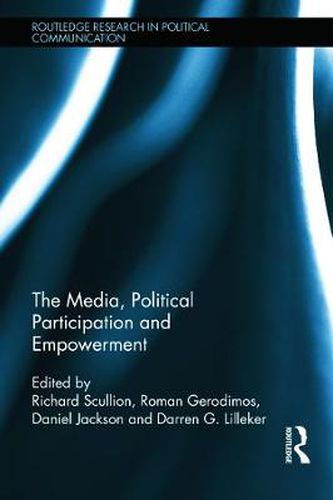Readings Newsletter
Become a Readings Member to make your shopping experience even easier.
Sign in or sign up for free!
You’re not far away from qualifying for FREE standard shipping within Australia
You’ve qualified for FREE standard shipping within Australia
The cart is loading…






Technological, cultural and economic forces are transforming political communication, posing challenges and opportunities for politicians and media organisations, while at the same time many governments and civil society express concerns about the extent and nature of political empowerment and civic engagement.
This book offers an international perspective on current thinking and practice about civic and audience empowerment, focusing on the ways and means through which media can empower or dis-empower citizens as audiences. It features theoretical and empirical chapters that draw specific attention to a reappraisal of the theories, methods and issues that inform our understanding of citizens and audiences in contemporary politics. The authors address the following questions:
How much and what sorts of civic and audience empowerment are most desirable, and how does this differ cross-nationally?
How do citizens relate to private and public spaces?
How do citizens function in online, networked, liminal and alternative spaces?
How do audiences of ‘non-political’ media spaces relate their experiences to politics?
How are political parties and movements utilising audiences as co-creators of political communication and what are the consequences for democracy?
With examples from the UK, USA, Holland, France, Germany, The Middle East, South Africa and Mexico, this innovative volume will be of interest to students and scholars of political science, marketing, journalism, cultural studies, public relations, media and international relations.
$9.00 standard shipping within Australia
FREE standard shipping within Australia for orders over $100.00
Express & International shipping calculated at checkout
Technological, cultural and economic forces are transforming political communication, posing challenges and opportunities for politicians and media organisations, while at the same time many governments and civil society express concerns about the extent and nature of political empowerment and civic engagement.
This book offers an international perspective on current thinking and practice about civic and audience empowerment, focusing on the ways and means through which media can empower or dis-empower citizens as audiences. It features theoretical and empirical chapters that draw specific attention to a reappraisal of the theories, methods and issues that inform our understanding of citizens and audiences in contemporary politics. The authors address the following questions:
How much and what sorts of civic and audience empowerment are most desirable, and how does this differ cross-nationally?
How do citizens relate to private and public spaces?
How do citizens function in online, networked, liminal and alternative spaces?
How do audiences of ‘non-political’ media spaces relate their experiences to politics?
How are political parties and movements utilising audiences as co-creators of political communication and what are the consequences for democracy?
With examples from the UK, USA, Holland, France, Germany, The Middle East, South Africa and Mexico, this innovative volume will be of interest to students and scholars of political science, marketing, journalism, cultural studies, public relations, media and international relations.